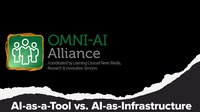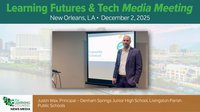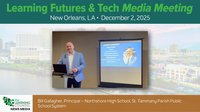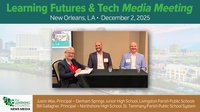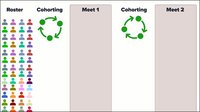When I stepped into my role as Director of Multi-Tiered Systems of Support, Secondary Schools at Friendship Public Charter School in June 2023, I was faced with a significant challenge. In the aftermath of the pandemic, the majority of our scholars in grades 6-12 were reading below grade level. It was clear that closing the achievement gap would require a comprehensive approach to literacy instruction grounded in the science of reading.
In 2021, the Office of the State Superintendent of Education (OSSE) in Washington D.C. published a Comprehensive Literacy Plan. Then in 2023, an Early Literacy Task Force Report provided more specific action items and recommendations for D.C. schools to align literacy instruction with the science of reading.
Friendship's Chief Executive Officer and Chief Academic Officer developed a literacy vision and collaborated with all stakeholders to create a Local Literacy Plan integrating the guiding principles for literacy instruction and interventions to support all students in becoming successful readers and writers. My role is to bring this vision to life in our grades 6-12 secondary schools.
Building Teacher Capacity Through Targeted Professional Learning
Our partnership with our literacy partner has been instrumental in helping to build teacher capacity and transforming literacy instruction across our schools. We designed a sequence of Professional Learning courses aligned with our literacy goals—particularly around enhancing vocabulary instruction and comprehension strategies. By curating a focused set of courses, we ensured teachers could engage deeply with the content and effectively apply their learning in the classroom.
Throughout this journey, our teachers have explored the science of reading, examining how students learn to read and write and what instructional practices are most effective. They now have a deep understanding of the essential components of literacy: phonological awareness, phonics, vocabulary, fluency, and comprehension. They have also learned practical strategies for differentiating instruction and supporting all learners in upper grade levels.
As we embarked on this initiative, we quickly learned the importance of flexibility and responsiveness. When our initial plan proved to be too much change too fast, we had to adjust. We wanted to be mindful of teachers' time and capacity. The revised plan resonated with staff better and set them up for success.
For the 2024-25 school year, we are committed to setting aside time for literacy professional learning. By carving out space for collaboration, reflection, and coaching, we can ensure our efforts lead to lasting change. We also plan to implement Professional Learning Communities (PLCs) to help teachers support literacy instruction across all content areas and strengthen the bridge between professional learning and classroom application.
Engaged Students, Empowered Learners
The impact of our literacy professional learning has been remarkable. As I visit classrooms, I see a transformation in the way students engage with texts and express ideas. The level of critical thinking is truly impressive.
Teachers share powerful stories of reaching reluctant readers, supporting English learners, and helping students find their voices. Equipped with a deeper understanding of the science of reading, our teachers are now weaving literacy instruction into all subjects, engaging students in meaningful reading, writing, and discussion that builds skills and knowledge. The result is a culture of empowered learners who see themselves as capable readers and writers.
Our professional learning program is also making the implementation of our literacy program in grades 6-8 more effective. By participating in Aspire PLCs, teachers will be able to infuse explicit literacy instruction across the curriculum to accelerate student learning and growth. I love all the components of the program and believe that offering professional learning units for course completion will further increase teacher buy-in and impact.
Using Data to Drive Instruction
Our literacy program’s support has been invaluable in using data to inform instruction and intervention. Through its assessment and learning tools, we have access to real-time data on student progress. Our teachers and leaders use this information to make decisions about grouping, pacing, and individualized support. By continuously monitoring and adjusting instruction based on data, we ensure every student gets the targeted support they need.
At the district level, we track key metrics to measure the success of our science of reading implementation, including teacher course performance in the professional learning program, evaluation data from instructional rounds, and student achievement data from the literacy program and other assessments. Analyzing this data biweekly allows us to keep our finger on the pulse of literacy growth.
Recommendations for Literacy Leaders
For any literacy leader looking to make the shift to the science of reading, I offer these recommendations based on our experience at Friendship Public Charter School:
- Develop a Local Literacy Plan and build out school-level implementation plans aligned to the science of reading.
- Engage teachers and staff to get feedback on the implementation plans and next steps. Leverage teacher leadership in the development process.
- Create systems of accountability to support the shift to a science of reading culture. Celebrate successes along the way!
- Design a professional learning calendar that prioritizes science of reading training and carve out dedicated time for it.
- Utilize a partnership that delivers strong resources, and courses - that are best in class.
- Actively review and analyze literacy data to inform instruction and decision-making. Share and review data reports with schools biweekly.
- Conduct co-observations with teachers and administrators to look for evidence-based practices in action. Provide bite-sized feedback.
Our Friendship team did not experience much resistance as we transitioned to science of reading instruction. Making time and space for professional learning, providing ongoing support, and celebrating teacher efforts have been key to building teachers’ investment in our transformation.
Moving Forward
As I reflect on how far we've come, I am filled with immense pride and gratitude. Our students are blossoming as readers and writers, and our teachers have grown into true literacy leaders. But I know this is just the beginning. Sustained effort and investment will be essential to realizing our vision of literacy success for every Friendship scholar.
Looking ahead, I am deeply committed to expanding my impact and supporting literacy at a greater scale, in service of the day when every student has access to the high-quality, science-aligned literacy instruction they deserve. Realizing this vision will require ongoing partnership, collaboration, and learning. But I wholeheartedly believe that with the right tools, mindset, and an unwavering focus on student potential, we can make it happen.
About the Author:
Tiffany Goodman is the Director of Multitiered Systems of Support—Secondary Schools at Friendship Public Charter School in Washington, D.C. Her school uses Lexia Learning for their professional learning courses and Lexia PowerUp for literacy.



